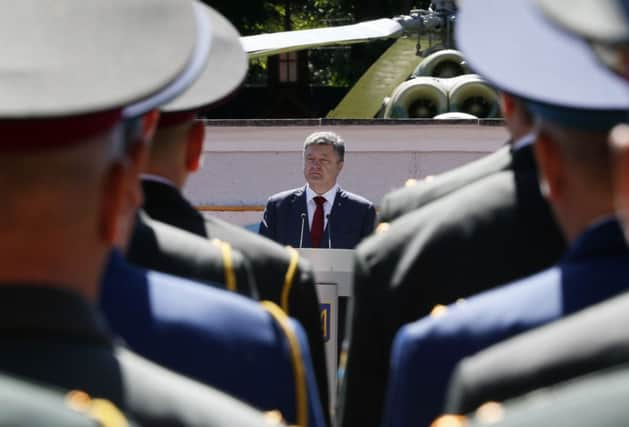Ukrainian president offers rebels a ceasefire


Petro Poroshenko made the announcement after discussions with Russian president Vladimir Putin by telephone.
Ukraine holds Moscow responsible for much of the violence in its east and has accused its neighbour of supplying arms and men to the rebels.
Advertisement
Hide AdAdvertisement
Hide Ad“The peace plan begins with my order for a unilateral ceasefire,” said Mr Petroshenko. “I can say the period of the ceasefire will be rather short. We anticipate that, immediately after this, the disarming of the illegal military formations will take place.”
Officials said the “temporary” ceasefire should be implemented “within hours or days” to provide pro-Russian separatists a chance to lay down their arms, and for any Russians involved to withdraw across the border.
Those who do give up the fight will be granted an amnesty, but already one rebel group has rejected the ceasefire.
The announcement came as fighting between government and rebel forces continued.
A spokesman for a government “anti-terrorist operation” said 30 rebel fighters had been killed on Tuesday in the town of Schastya, in the turbulent Luhansk region.
A bomb blast yesterday also destroyed a pipeline in Ukraine’s Poltava province carrying Russian gas to western Europe, bringing allegations of sabotage from Kiev aimed at Russia.
Highlighting the gravity of the situation, Mr Poroshenko claimed “Ukraine is in a state of war,” and that Russia is waging “a new type of warfare – with the use of professional subversive groups, mercenaries, volunteers, and the local population.”
He added: “These volunteers and the local population have had their ‘brains washed’ in huge part due to the information war.”
Advertisement
Hide AdAdvertisement
Hide AdBacked by the Organisation for Security and Co-operation in Europe (OSCE) the “peace plan” aims to reduce the tension in eastern Ukraine, and the ceasefire, if it goes ahead, should pacify Russia, which has long claimed the Ukrainian military offensive against the rebels was a threat to peace.
Sergey Lavrov, the Russian foreign minister, said any ceasefire should be “comprehensive” not temporary.
He added that if it led to negotiations then “that would be the step Mr Poroshenko has promised and that we have been waiting for”.
Moscow’s support for the plan seems to reflect a slight change in policy over Ukraine.
In recent weeks it has taken some steps to lessen tensions by supporting Ukraine’s presidential elections in May, pulling its troops back from the border and only offering negligible support for independence referendums in Ukraine’s disputed eastern territories.
A ceasefire with negotiations would allow Moscow to withdraw, rather than being forced into a possibly futile battle, or accepting a defeat that could provide plenty of evidence of the Kremlin’s alleged military involvement.
Any settlement could also spare Russia from more western sanctions, and reduce pressure on the Kremlin from hard-line nationalists who want to directly support pro-Russians in Ukraine.